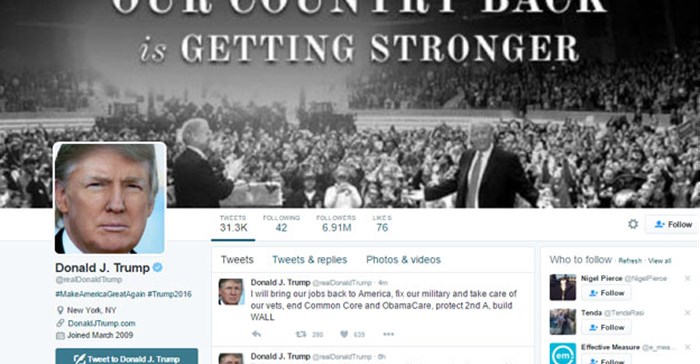I read two articles this week, which I found pretty interesting. The first was a piece in the Telegraph. It was about how television spend in the UK had exceeded 5 billion pounds for the first time. In the article it mentioned the biggest new spender on television was Facebook, spending 10.8 million pounds. It also mentioned that Google, Netflix and Facebook spend 60 percent of their marketing spend on television, trying to give their brands some emotion and feeling. 60 percent. I will let that sink in for a while.
The second article was in an American publication (I think it was The Huffington Post) and it spoke about the differences between Donald Trump and Hillary Clinton. In essence, the article's point was that Hillary Clinton didn’t have a logic problem, she had a feeling problem. People might agree with her but they don’t feel very much. Her brand makes sense logically but for many there is no connection emotionally. Then there is Donald Trump.
Now, let me nail my colours to the mast. I am no fan of Donald Trump. Like, at all.

Trump on Twitter
For many, when he started he was seen as a joke. We all thought he stood no chance. Even to this day he has almost no clearly articulated policies, apart from building a large wall that he believes Mexico will pay for. Yet, despite this, he has been enormously successful. And this success goes against pretty much every poll that was taken earlier this year. The logic said he had no chance. Research got it very wrong. So, what does he have? The simple answer is emotion. Feeling. Watch any Republican debate and you will see how Trump makes the other, more rational candidates seem boring. They were like beige, frightened cardigans who didn’t know if they should push their sleeves up or leave them down. They prepared for a polite debate. He turned it into a street fight.
And the street fight has continued as you can see by the unfortunate events in Chicago. He is either loved or hated in equal measure. He has been compared to Hitler. He often says things that no other politician would dream of saying. And, on the flip side, his supporters adore him because they say Trump tells it like it is. All this has created emotion that has fuelled the media to such an extent that he has had to spend virtually nothing on advertising. This emotion has changed just about every rule of running a political campaign and creating political advertising
What he has proved is that something can be logical, make total sense, yet struggle to break through because ultimately when it comes to human beings, emotion will always trump reason. No pun intended.
So, with that in mind, perhaps the media spend of Google, Netflix and Facebook in the UK makes a bit more sense. I think they are obviously trying to reach the mass market and trying to grow quickly, which obviously says a lot about the power television has as a medium. However, there is another lesson for me: They need emotion.
As a brand you can make total sense, you can have a great product and can be very useful but you had better make people feel something.
The three brands I have mentioned are extremely useful and totally dominate the landscape. But of course the world changes. Just Ask Jeeves. And, if you have a number of competitors that are as useful as you, what do you do then? Perhaps this explains why very modern, very rational tech brands are making these choices. They need people to feel something about them.
I am aware what I am saying is very unfashionable. For the last couple of years as an industry we have tried to become useful in new ways. Re-invent ourselves. We have created a lot of very useful products and apps. There is also a drive towards the rational. We have become a little wary of what our killer app has always been.
Creating pure emotion.
However, if there is anything to learn from the Trump campaign and perhaps the strange media spend of some giant tech brands, it is this:
The power of emotion rather than logic is still the biggest disruptor of them all.
“There is science, logic and reason; there is thought verified by experience. And then there is California.” Edward Abbey
*Note that Bizcommunity staff and management do not necessarily share the views of its contributors - the opinions and statements expressed herein are solely those of the author.*



































